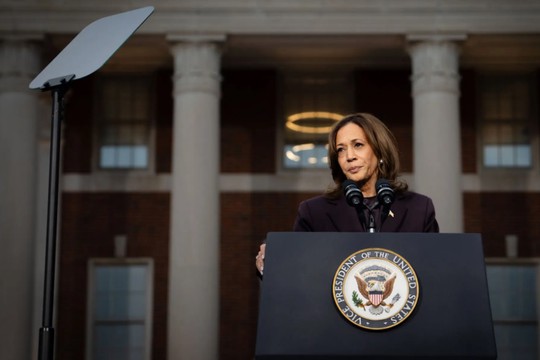Kamala Harris doesn't laugh anymore…
Photo: The New York Times
A depressed and demoralized Democratic Party is beginning the painful slog into a largely powerless future, as its leaders grapple with how deeply they underestimated Donald J. Trump’s resurgent hold on the nation, writes ‘The New York Times’.
The nationwide repudiation of the party stunned many Democrats who had expressed a “nauseous” confidence about their chances in the final weeks of the race. As they sifted through the wreckage of their defeats, they found no easy answers as to why voters so decisively rejected their candidates.
In more than two dozen interviews, lawmakers, strategists and officials offered a litany of explanations for Vice President Kamala Harris’s failure — and just about all of them fit neatly into their preconceived notions of how to win in politics.
The quiet criticism, on phone calls, in group chats and during morose team meetings, was a behind-the-scenes preview of the intraparty battle to come, with Democrats quickly falling into the ideological rifts that have defined their party for much of the Trump era.
What was indisputable was how badly Democrats did. They lost the White House, surrendered control of the Senate and appeared headed to defeat in the House. They performed worse than four years ago in cities and suburbs, rural towns and college towns. An early New York Times analysis of the results found the vast majority of the nation’s more than 3,100 counties swinging rightward since President Biden won in 2020.
The results showed that the Harris campaign, and Democrats more broadly, had failed to find an effective message against Mr. Trump and his down-ballot allies or to address voters’ unhappiness about the direction of the nation under Mr. Biden. The issues the party chose to emphasize — abortion rights and the protection of democracy — did not resonate as much as the economy and immigration, which Americans often highlighted as among their most pressing concerns.
Many Democrats were considering how to navigate a dark future, with the party unable to stop Mr. Trump from carrying out a right-wing transformation of American government. Others turned inward, searching for why the nation rejected them.
They lamented a Democratic Party brand that has become toxic in many parts of the country. Several noted that the independent Senate candidate in Nebraska ran 14 percentage points ahead of Ms. Harris in the state.
And many said they were struggling to process the scale of their loss, describing their feelings as a mix of shock, mourning and panic over what might come in a second Trump administration.
Senator Bernie Sanders of Vermont, the longtime progressive standard-bearer, blamed what he called a party-wide emphasis on identity politics at the expense of focusing on the economic concerns of working-class voters.
“It’s not just Kamala,” he said. “It’s a Democratic Party which increasingly has become a party of identity politics, rather than understanding that the vast majority of people in this country are working class. This trend of workers leaving the Democratic Party started with whites, and it has accelerated to Latinos and Blacks.”
Representative Seth Moulton of Massachusetts, who was one of two dozen Democrats who sought the party’s presidential nomination in 2020, suggested the party should shift its approach to transgender issues.
“Democrats spend way too much time trying not to offend anyone rather than being brutally honest about the challenges many Americans face,” Mr. Moulton said. “I have two little girls, I don’t want them getting run over on a playing field by a male or formerly male athlete, but as a Democrat I’m supposed to be afraid to say that.”
And then there was the blame for Mr. Biden.
Even before he announced his run for re-election, Democrats were whispering that the president, now 81, was too old to seek re-election, and polls confirmed that voters had serious reservations.
Democrats who were worried at the time now say Ms. Harris never really had a chance.
“The dynamics of this race were baked in before Kamala Harris became a candidate,” said Julián Castro, the former housing secretary who also ran for president in 2020. “She was dealt a bad hand. She was trying to get elected in the shadow of a president who was unpopular and who the public had overwhelmingly been saying should not run for re-election and took too long to step aside.”
On Thursday, Mr. Biden addressed the nation from the Rose Garden, urging his supporters to remain optimistic and tenacious.
“Setbacks are unavoidable, but giving up is unforgivable,” he said. “We all get knocked down, but the measure of our character, as my dad would say, is how quickly we get back up.”
As they reflected on the fallout, Democratic officials compared notes about where this Election Day ranked on their list of horrible experiences.
Matt Bennett, the executive vice president for public affairs at Third Way, a centrist think tank, said the party had not faced a crisis as severe since the 1980s, when Democrats lost three straight presidential races in landslides.
“The one way to beat a right-wing populist is through the center,” Mr. Bennett said. “You must become the party that is more pragmatic, reasonable and more sane. That’s where we have to go.”
With Mr. Biden and Ms. Harris now political lame ducks, the Senate majority gone and without a likely House speaker in the party, Democrats in 2025 will find themselves short on clear leaders, as they did after Mr. Trump won in 2016.
The next decision party leaders face is whom to choose as the next leader of the Democratic National Committee, a post that was largely ceremonial with Mr. Biden in office but will include far more responsibilities and power without White House officials calling the shots.
read more in our Telegram-channel https://t.me/The_International_Affairs

 10:01 14.11.2024 •
10:01 14.11.2024 •























